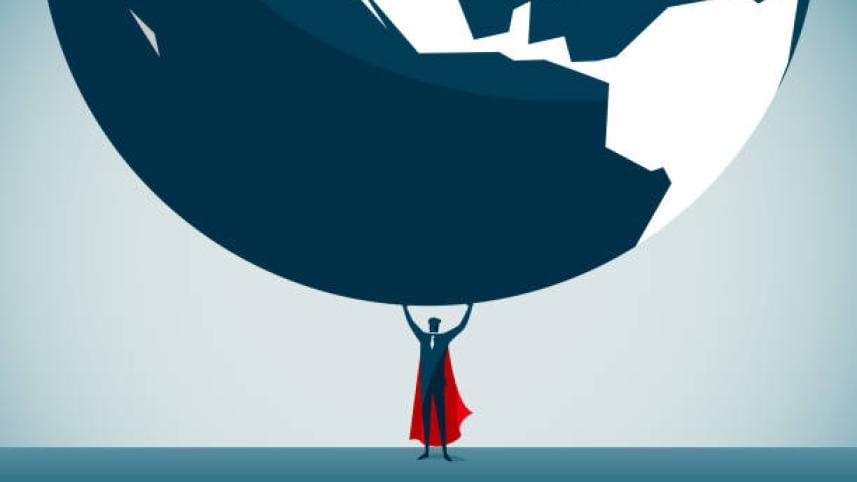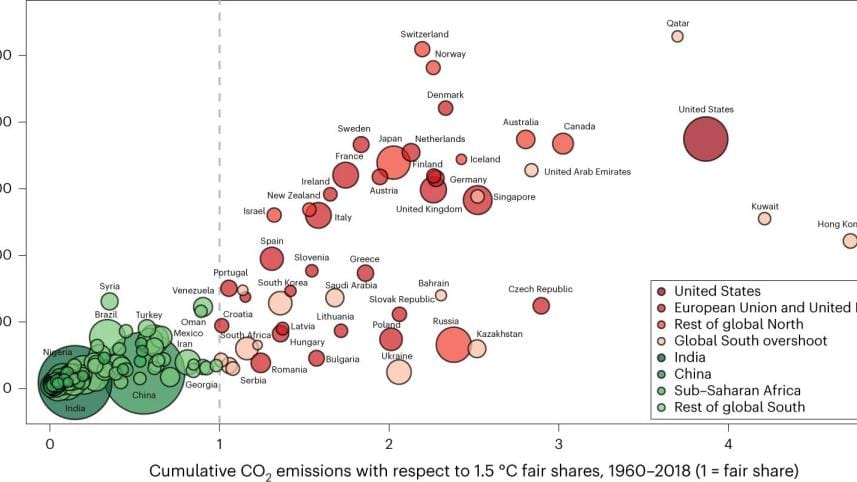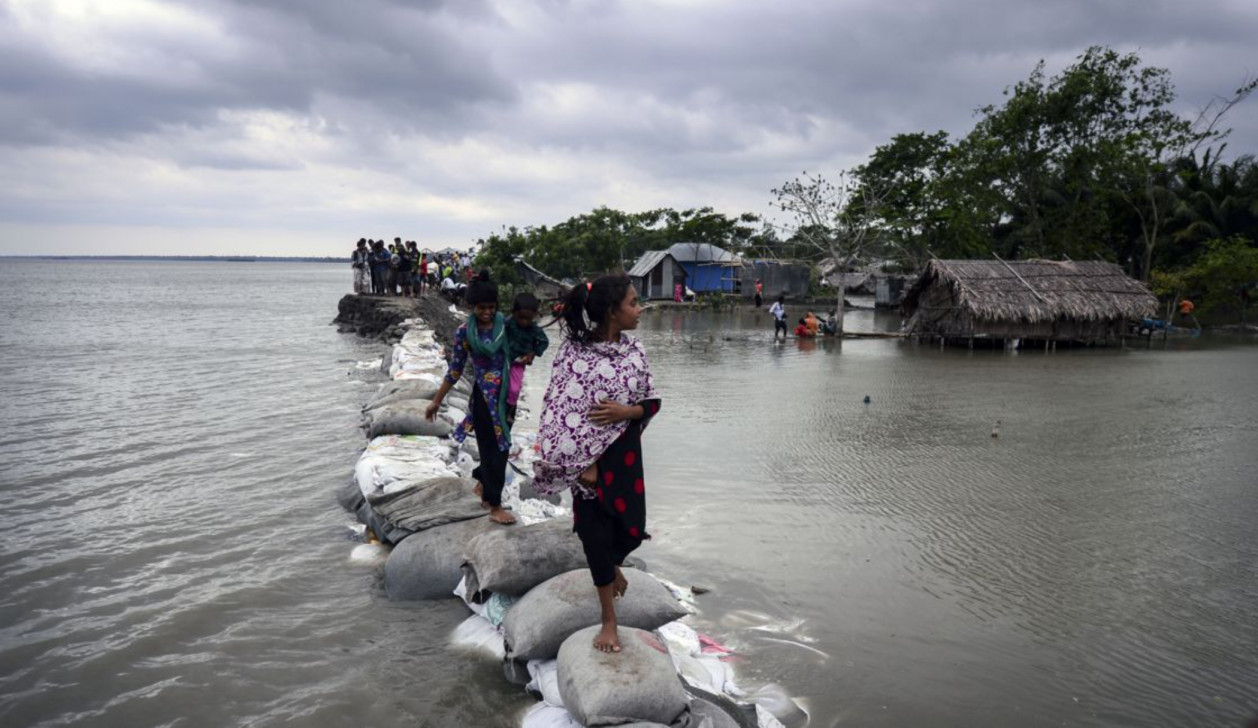Heroes and villains of the climate crisis

In Alexander Ward's book The Internationalists, there is an account of a debate between the United States Special Presidential Envoy for Climate John Kerry and National Security Advisor Jake Sullivan on how the United States should address the issue of China in climate negotiations. Kerry argues that America and China must cooperate. Sullivan disagrees—they should focus on "boxing China out" and make deals with other countries. Sullivan argues that they should instead present China as the main climate villain, and force them to the negotiating table on US' terms.
Economist Raghuram Rajan recently wrote an article for the Financial Times in the aftermath of the Indian elections, arguing that the Modi administration's focus on expanding manufacturing is misguided: "The world does not have political or climatic room for another China-sized economy exporting manufactured goods." Notably, the lack of room is both "political" and "climatic". The unspoken "political" factor here is the recent American anxiety around Chinese overcapacity—G7 economies are worried about losing advanced manufacturing capacity to competitors in all emerging markets (not just China).
The "climatic" factor brings us back to the question of climate justice.
Who is the real "climate villain?"
Historical emissions and global inequality
How can one measure climate villainy? If we were to take annual carbon emissions, then the primary villain is very clear—it is the People's Republic of China, followed by the United States of America. If we measure "climate villainy" on this scale then one can even present the US as a relative "climate hero"—it's an example of a large, high-population economy that can sustain a higher quality of life than China while producing fewer emissions. Thanks to the radical green agenda in Biden's Inflation Reduction Act (glowingly endorsed by progressives) and the visionary entrepreneurialism of Elon Musk, it will be the US that saves the world from the climate crisis, just as it saves the world from every crisis.
This is the story US progressives would like to tell—of the climate hero America saving the world from the climate villain China.
The problem with looking only at annual carbon emissions is that carbon has accumulated over time. The climate crisis is not caused by present-day emissions, it is caused by the sum total of historical emissions. Once we account for the issue of historical emissions, we confront the heart of the matter: the benefits of historical carbon consumption are restricted to a small handful of advanced economies, former Warsaw Pact countries and Gulf Arab petrostates, but the costs have to be borne by us all.
Consider the figure below, taken from a Nature Sustainability paper by climate scientist Jason Hickel:

The y-axis shows the cumulative GDP per capita from 1960-2018. The x-axis measures how much each country has overshot or undershot the global carbon budget needed to restrict warming to 1.5 degrees Celsius, relative to a hypothetical world where historical carbon consumption was divided equally according to population—a value of 1 represents a country that has consumed exactly its fair share of global carbon.
A striking pattern emerges almost immediately—almost 70 percent of cross-national differences in cumulative per capita GDP can be explained solely by differences in cumulative emissions over time. Thus, it is impossible to disentangle the issue of global inequality from historical carbon emissions. With the exception of primarily the Gulf petrostates, the entirety of the Global South is in the bottom left of the chart, coloured in green. The figure ends in 2018, rapid economic development in the intervening period has since caused China to slightly overshoot its fair share. But the main climate villain when we take historical emissions into account is very clear—it is the US.
Liability vs generosity
The solution to the problem of historical emissions is quite straightforward—Global North (red in the graph) countries owe liability payments to Global South (green) countries for exceeding their fair shares of the atmospheric commons. This would enable emissions reductions while still allowing for "catch-up" growth in the Global South, and help solve long-standing issues of global inequality. COP would be the ideal venue to negotiate these payments.
However, the topic of liability payments at COP is consistently blocked by the Western negotiating bloc, particularly the US. The concept of Common but Differentiated Responsibility (CBDR) was enshrined into international climate law in the Paris Agreement to acknowledge the issue of historical emissions but is under attack every year from Western nations. CBDR acknowledges that while all countries must act on climate change, the nature of our responsibilities is different and corresponds to our historic emissions. This framework is essential to protecting every sovereign nation's inherent human right to development. It is also essential to preserve as we pursue climate justice. Jake Sullivan's strategy for climate negotiations with China suggests that senior American policymakers have abandoned it completely, choosing instead to use climate politics to suppress economic development in Global South competitors.
Let us return to Raghuram Rajan's prescriptions for the Indian economy. "Climatic" factors are only a barrier to industrial development in India if we take the US position that only present-day emissions matter in determining climate responsibility. A historical emissions framework gives countries in the Global South room to grow and to reach some kind of parity in economic prosperity with the advanced economies. Liability payments offer a mechanism to achieve that parity.
By now I hope the readers can fully comprehend the dark motivations behind the consistent blocking of liability payments at COP. We should recognise this for what it is—an attempt by the Global North to use the climate crisis to lock in current patterns of global inequality and maintain their position of privilege in the commanding heights of the world economy. In the context of China, it was even to be used as a way to neutralise an economic competitor.
We speak of Bangladesh in terms of "climate vulnerability". This is how the Global North would like to see us, as "vulnerable" people who exist only to be saved by their generosity and benevolence. This is the language of NGOs and aid dependency. This language also directs us away from the issue of liability payments that we are owed by the Global North. The climate crisis was not caused by Bangladesh, but the lives it claims will be disproportionately from Bangladesh. When you are not owed liability, you can only be grateful for generosity. We need to break out of this paradigm.
Look again at the figure given.Don't look at it through the lens of personal self-sacrifice and bleeding-heart activism. Don't look at it through the eyes of NGOs. Look at it through the lens of your material self-interest. The emergence of China as a peer competitor to the United States creates the scope for the formation of a counter-hegemonic Global South bloc that can exercise coercion on Global North countries to demand liability payments and an acceptance of the historical emissions framework. In the present moment, this is the clearest path forward to climate justice.
Zain Omar Ali is a PhD student in genetics at Lund University. Bareesh Hasan Chowdhury works on environment and climate and is interested in the sustainable energy transition.
Views expressed in this article are the authors' own.
Follow The Daily Star Opinion on Facebook for the latest opinions, commentaries and analyses by experts and professionals. To contribute your article or letter to The Daily Star Opinion, see our guidelines for submission.



 For all latest news, follow The Daily Star's Google News channel.
For all latest news, follow The Daily Star's Google News channel. 

Comments